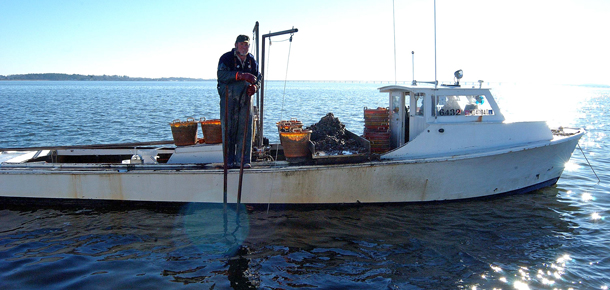Knauss legislative fellowships in Congress help build careers — and they're fun and educational. See our video and fact sheet for details.
Economics

For centuries, the Chesapeake Bay has provided a livelihood to many Marylanders. People have tonged for oysters and worked in the tourism and recreation industries. Many businesses depend on the Bay’s natural resources.
Economists at Maryland Sea Grant Extension provide expert analyses and recommendations to policymakers, companies, and the public. The goal is to help businesses increase their profits in ways that are both environmentally and economically sustainable.
Aquaculture Business Planning and Management Tool
Maryland Sea Grant Extension specialist Matt Parker developed an online economic spreadsheet for aquaculture business owners and operators. The tool is designed to help estimate costs and returns; determine expenses, cash flow, and other aspects of management; and maximize potential profit. It helps aquaculture businesses evaluate "what if" scenarios when planning and making projections for the future.
For detailed instructions on how to use the tool and recorded webinars on how to interpret results, visit the University of Maryland Extension website.
Blue Crab License “Buy Back” Program
We collaborated with the Maryland Department of Natural Resources (DNR) to help design a state program to buy unused commercial fishing licenses for blue crabs.
Aided by our analyses about license prices, DNR purchased several hundred licenses from Marylanders who had not fished for crabs in years. The goal was to help sustain the blue crab’s fragile recovery in the Bay. And to help stabilize prices that working watermen earn for their catches.
Read more about the project in “The Value of Crabbing,” an article in Chesapeake Quarterly, Maryland Sea Grant’s magazine.
Natural Resource Economics and Seafood Marketing
Economic Valuation of Natural Resources for Coastal Resources Policymakers
To inform policymakers and others involved in environmental regulation, Extension specialists helped to author an information booklet, Economic Valuation of Natural Resources: A Guidebook for Coastal Resources Policymakers.
The authors describe how local governments and agencies can analyze the costs and benefits of environmental decisions and regulations. It describes tools that have helped decision makers across the country. Some of the book's contents include:
- An introduction to incorporating cost-benefit analyses in environmental decision making.
- Tools to evaluate the economic benefits of non-market goods and services, such as recreational fishing or wildlife viewing.
- Case studies, including oyster restoration in the Bay.
Changes in Consumer Preferences for Seafood Products Due to the COVID-19 Pandemic
In 2020, Virginia Tech's Virginia Seafood Agriculture Research and Extension Center (AREC) partnered with Maryland Sea Grant Extension and New York Sea Grant Cooperative Extension to gather market information on changes in how, when, and where consumers purchased seafood in 2020 (in response to the COVID-19 pandemic) compared to their purchases in 2019 (pre-pandemic). Maryland households were
surveyed on the Eastern Shore, Montgomery County, and Prince George's County.
Virginia Cooperative Extension published reports summarizing responses about seafood purchases from households in these areas. Survey data varied across the regions. Importantly, key demographic groups, including Black and Hispanic residents, were underrepresented in the households surveyed compared to the overall demographics of each region. Future surveys will be strengthened by intentionally collecting data that more closely reflects localized U.S. Census demographic data.
Economic Impact of Recreational Boating
Extension specialists worked to quantify the impacts of recreational boating on Maryland's economy. They found that boaters within the state, or just visiting, generate $1 billion annually. But that influx creates trade-offs, potentially affecting local water quality.
Maryland Sea Grant reports on recreational boating can be found here:
- Transient Boating in Maryland: The Economic Impact of Out-of-State Boater Spending
- Economic Impact of Maryland Boating in 2009
- Boating 2000: A Survey of Boater Spending in Maryland
Maryland Sea Grant Extension Personnel






